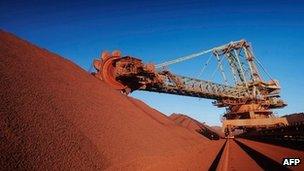Australia's economic growth slows in second quarter
- Published

Slowing growth in key markets such as China has hurt Australia's mining sector
Australia's economic growth rate slowed in the second quarter amid a drop global demand for its resources and lacklustre domestic consumption.
Growth was 3.7% in the April to June period, from a year earlier. That is down from 4.3% annual growth in the same period last year.
Compared with the previous quarter, the economy expanded by 0.6%.
There are fears that Australia's growth may slow further as demand for its resources slows.
"We are moving into a fairly risky phase of the Australian economy with the mining sector looking a bit ragged," said Shane Oliver, chief economist at AMP Capital Investors.
Mining worries
Australia's mining sector has been one of the biggest drivers of its growth in recent years.
However, slowing growth in key markets such as China and India has hurt demand for Australia's resources and impacted the sector's growth.
To make matters worse, prices of commodities such as iron ore have also fallen in recent months, hurting mine companies' profits.
That has forced some companies to put their expansion plans on hold, hurting investment in the economy.
In the past few days, BHP Billiton and Fotescue Metal Group, two of Australia's biggest miners, have announced a delay in expanding their facilities in Australia.
Analysts said the combination of all these factors was having a negative impact on Australia's growth and that if commodity prices do not improve it may hurt long-term growth.
"If the iron ore price stays where it is, then there is a real threat to growth in 2013," said Mr Oliver of AMP Capital.
Iron ore prices have fallen almost 30% in just the last two months.
'Much more challenging'
Australia's economy has also been hurt by a variety of other reasons, not least a subdued domestic consumption.
Data released earlier this week showed the retail sales in Australia fell 0.8% in July from the previous month, the biggest drop in two years.
Company profits also dropped 0.7% in the April to June period, from the previous three months, the third straight quarter of decline in incomes.
At the same time, a strong Australian currency has also hurt the exports sector.
The Australian dollar has risen more than 8% against the US dollar since June making Australian goods more expensive to foreign buyers.
Analysts said that these issues and a slowdown in the country's mining sector may hurt growth in coming months.
"The second half is going to be much more challenging," said Stephen Walters, chief economist at JP Morgan.
"You're not going to get the same sort of growth rate we have had."
- Published4 September 2012
- Published28 August 2012
- Published23 August 2012